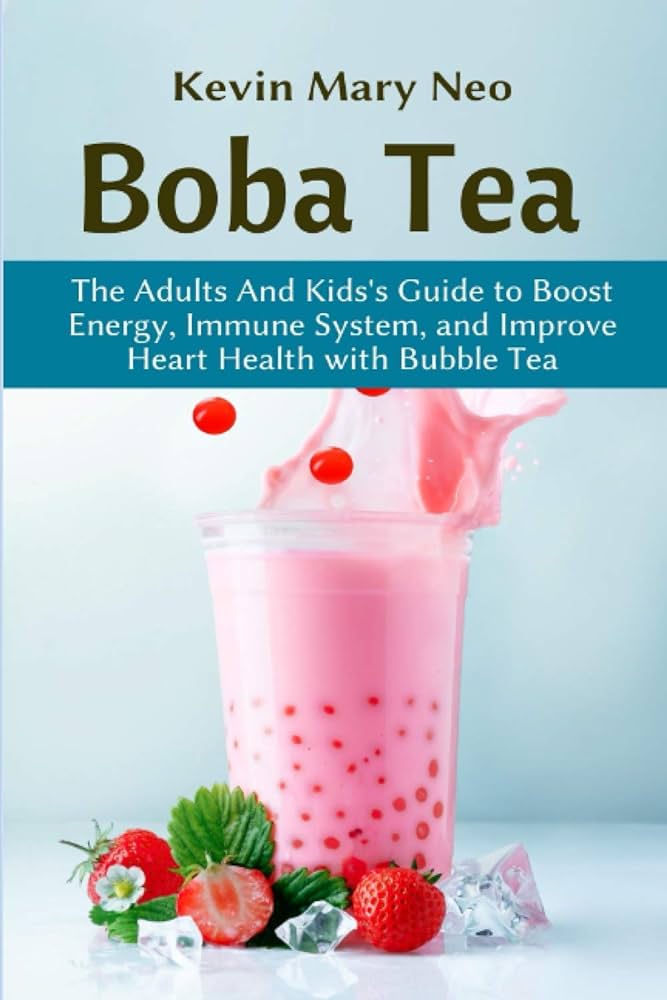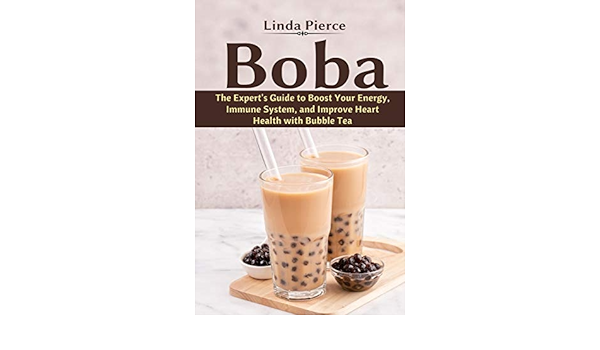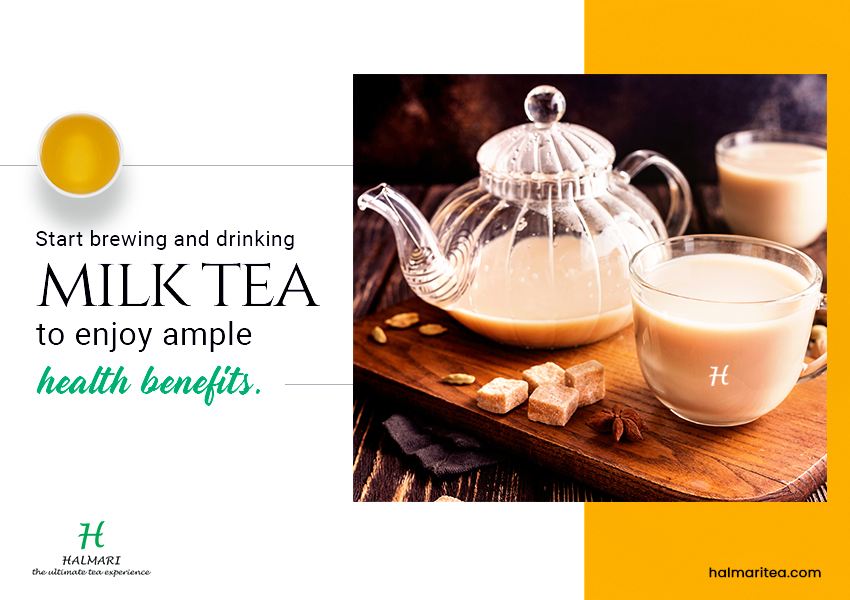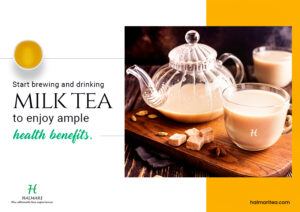Boosting Your Well-being with Milk Tea
Did you know that your daily cup of milk tea is not only a delicious treat but also has potential health benefits? Milk tea, also known as boba tea, has gained immense popularity around the world for its unique combination of tea, milk, and chewy tapioca pearls. Not only does it provide a refreshing and indulgent flavor, but it may also contribute to your overall well-being. In this article, we will explore the health benefits of milk tea and how it can be a delightful addition to your daily routine. So sit back, relax, and let’s discover the wonders that milk tea has to offer.

Choosing the Right Milk Tea Base
When it comes to choosing the right milk tea base, there are several options to consider. Different types of milk tea bases have unique flavors, textures, and health benefits. It’s important to choose a base that aligns with your taste preferences and dietary needs. Common milk tea bases include black tea, green tea, oolong tea, and herbal tea. Each type has its own distinct qualities that can enhance your milk tea experience.
Different Types of Milk Tea Bases
-
Black tea: This is the most common base for milk tea. Black tea has a robust flavor and is known for its rich and deep color. It pairs well with milk and sugar, creating a classic milk tea taste. Black tea is also a good option for those who enjoy a stronger and bolder flavor.
-
Green tea: For those looking for a lighter and more refreshing milk tea base, green tea is a great choice. Green tea has a milder flavor and is packed with antioxidants. It provides a subtle and clean taste that complements the sweetness of milk and other additives.
-
Oolong tea: Oolong tea falls between black tea and green tea in terms of flavor and caffeine content. It has a slightly floral and fruity taste, making it a unique base for milk tea. Oolong tea is known for its complex flavors and aromatic qualities, which can add depth to your milk tea.
-
Herbal tea: If you prefer to avoid caffeine or have dietary restrictions, herbal tea can be a wonderful alternative. Herbal teas are made from various plants and flowers, and each type offers a different flavor profile. Common herbal tea options for milk tea include chamomile, lavender, and peppermint. These teas often have a soothing and calming effect, adding another layer of relaxation to your milk tea experience.
Health Considerations for Milk Tea Bases
When choosing a milk tea base, it’s important to consider the health benefits and potential drawbacks. While milk tea can offer a range of benefits, it’s worth noting that some bases may have a higher caffeine content or be less suitable for certain health conditions. If you have specific dietary restrictions or concerns, it’s always best to consult with a healthcare professional.
Nutritional Benefits of Milk Tea
Milk tea can provide several nutritional benefits, making it more than just a refreshing beverage. The combination of tea and milk offers a unique mixture of antioxidants, vitamins, and minerals that contribute to overall well-being.
Rich in Antioxidants
Tea is known for its high content of antioxidants, which help protect the body against free radicals and oxidative stress. Milk tea, made with different tea bases, still retains many of these beneficial compounds. Antioxidants have been linked to various health benefits, including reducing the risk of chronic diseases such as heart disease and certain types of cancer. By incorporating milk tea into your routine, you can enjoy the antioxidant benefits while satisfying your taste buds.
Provides Essential Nutrients
Milk, a key ingredient in milk tea, is a good source of essential nutrients. It contains calcium, vitamin D, and protein, which are vital for maintaining overall health. Calcium helps build and maintain strong bones, while vitamin D aids in calcium absorption. Protein is necessary for muscle development and repair. By combining milk with tea, you’re able to enjoy the benefits of both ingredients in a delicious and convenient way.
May Support Digestive Health
Certain types of tea, such as green tea and herbal teas, have been traditionally used to support digestive health. These teas can help alleviate symptoms like bloating, indigestion, and nausea. By incorporating them into your milk tea, you can potentially enhance the digestive benefits. However, it’s important to note that individual reactions to tea can vary, and it’s always recommended to listen to your body and consult a healthcare professional if you experience any adverse effects.
Boosting Energy and Alertness
Many people turn to milk tea for a quick pick-me-up, especially on busy days. The caffeine content in tea can provide a gentle energy boost, while the combination of tea and milk creates a satisfying and invigorating drink.
Caffeine Content in Milk Tea
The caffeine content in milk tea varies depending on the type of tea used as the base. Black tea typically has the highest caffeine content, followed by oolong tea, green tea, and herbal teas. Caffeine is a natural stimulant that can help increase alertness and improve focus. It can also temporarily ward off drowsiness and fatigue.
Stimulating Effect of Milk Tea
Beyond the caffeine content, milk tea also has a stimulating effect due to its comforting and enjoyable nature. The act of sipping on a warm or cold milk tea can provide a sense of relaxation and mental clarity. This can be especially beneficial during study sessions or when you need a brief break from a hectic day. The combination of the caffeine and the serene experience of drinking milk tea can make you feel rejuvenated and ready to tackle any challenge.
Promoting Weight Management
For those looking to manage their weight, incorporating milk tea into a well-balanced diet may be a helpful strategy. Some milk tea options are lower in calories, and the potential benefits of certain tea bases can aid in weight loss.
Low-Calorie Milk Tea Options
If you’re watching your calorie intake, there are low-calorie milk tea options available. Opting for unsweetened or lightly sweetened versions can significantly reduce the calorie content. Additionally, using alternative milk options, such as almond milk or oat milk, can further lower the calorie count and offer different flavor profiles. It’s important to be mindful of the additional toppings and sweeteners that can increase the calorie content, so customizing your milk tea wisely can support your weight management goals.
Potential Weight Loss Benefits
Certain tea bases, such as green tea and oolong tea, have been studied for their potential weight loss benefits. These teas have been found to increase metabolism and fat oxidation, which can help with weight management. While milk tea alone may not directly lead to weight loss, incorporating tea bases known for their weight loss properties into your milk tea can be a step towards achieving your weight goals.

Reducing Stress and Anxiety
In today’s fast-paced world, finding moments of relaxation and tranquility is essential for overall well-being. Milk tea can offer a soothing and uplifting experience that may help reduce stress and anxiety levels.
Mood-Enhancing Effects of Milk Tea
Sipping on a warm cup of milk tea can be a comforting and mood-enhancing ritual. The combination of tea and milk can produce a calming effect, providing a sense of well-being. The act of enjoying a delicious beverage in itself can also be a mood-booster, creating a moment of self-care and relaxation. Whether it’s taking a break from work or winding down after a long day, milk tea can be a friendly companion to help elevate your mood and reduce stress.
Herbal Additions for Relaxation
To further enhance the stress-reducing properties of milk tea, you can incorporate herbal additions known for their calming effects. Chamomile, lavender, and peppermint are popular choices that can promote relaxation and ease tension. These herbs have been used for centuries in traditional medicine for their soothing properties. By infusing your milk tea with these herbal additions, you can create a beverage that not only tastes great but also helps alleviate stress and anxiety.
Enhancing Immune Function
The immune system plays a crucial role in protecting the body against illnesses and infections. Milk tea, with its unique blend of tea and milk, can offer certain immune-boosting properties that contribute to overall health.
Antibacterial and Antiviral Properties
Certain tea bases, such as black tea and green tea, contain compounds that exhibit antibacterial and antiviral properties. These properties help prevent the growth and spread of harmful bacteria and viruses within the body. By incorporating milk tea into your daily routine, you can potentially give your immune system a natural boost.
Strengthening the Immune System
Milk, a key ingredient in milk tea, contains essential nutrients like vitamin D and protein that play a crucial role in maintaining a healthy immune system. Vitamin D is known for its immunity-enhancing benefits, while protein provides the building blocks for immune cells. By pairing milk with tea, you can create a beverage that not only tastes delightful but also supports your immune system.

Supporting Bone Health
Maintaining strong and healthy bones is important for overall well-being, especially as we age. Milk tea, with its combination of tea and milk, can provide essential nutrients that support bone health.
Calcium and Vitamin D Content in Milk Tea
Milk is known for its calcium content, which is vital for bone health. Calcium helps build and maintain strong bones and teeth, reducing the risk of conditions like osteoporosis. The combination of tea and milk in milk tea allows you to enjoy the benefits of both ingredients. Additionally, milk is a natural source of vitamin D, which aids in calcium absorption, further promoting bone health.
Prevention of Osteoporosis
Osteoporosis, a condition characterized by weak and brittle bones, is a common health concern, particularly among older individuals. Milk tea, when consumed as part of a balanced diet, can contribute to the prevention of osteoporosis. The combination of calcium and vitamin D in milk tea provides the necessary nutrients for maintaining bone density and strength.
Improving Skin Health
A healthy and vibrant complexion is something many strive for. Milk tea can contribute to skin health through its unique blend of tea and milk.
Antioxidants for Skin Protection
Tea, a key component of milk tea, contains antioxidants that help protect the skin from damage caused by free radicals. Free radicals are unstable molecules that can induce oxidative stress and lead to premature aging and skin damage. By incorporating milk tea into your routine, you can enjoy the skin-protecting benefits of antioxidants while indulging in a delicious beverage.
Hydration and Moisturization
Milk, an essential ingredient in milk tea, provides hydration and moisturization to the body, including the skin. Proper hydration is vital for maintaining healthy skin since it helps to keep the skin moisturized and supple. By combining milk with tea, you can enjoy a beverage that not only quenches your thirst but also contributes to the overall health and appearance of your skin.

Relieving Menstrual Symptoms
For many women, menstrual symptoms can be uncomfortable and disrupt daily activities. Milk tea can provide relief from certain symptoms and support hormonal balance during this time.
Reducing Cramps and Pain
Many women experience menstrual cramps and pain during their menstrual cycles. The warmth and comforting nature of milk tea can help alleviate these symptoms. The act of drinking warm milk tea can provide relaxation and soothe the muscles, potentially reducing cramps and pain.
Regulating Hormonal Imbalance
Certain herbal teas used as a base for milk tea, such as chamomile and peppermint, have been traditionally used to regulate hormones. These herbal additions can potentially help balance hormones during menstruation and provide relief from mood swings and irritability. By incorporating milk tea into your routine during your menstrual cycle, you can potentially mitigate some of the discomfort associated with hormonal imbalance.
Enhancing Cognitive Function
Maintaining good cognitive function is essential for productivity, learning, and overall mental well-being. Milk tea can provide certain benefits that enhance cognitive function and support brain health.
Improvement in Memory and Focus
The caffeine content in milk tea can have a positive impact on memory and focus. Caffeine is known to improve attention and alertness, helping you stay focused and mentally sharp. By enjoying a cup of milk tea, you can potentially boost your cognitive performance and enhance your ability to concentrate.
Prevention of Neurodegenerative Diseases
Some tea bases used in milk tea, such as green tea, have been studied for their potential neuroprotective properties. Green tea contains compounds that may help protect the brain against neurodegenerative diseases, such as Alzheimer’s and Parkinson’s. While further research is needed, incorporating green tea-based milk tea into your routine can potentially contribute to long-term brain health.
In conclusion, milk tea offers not only a flavorful and refreshing beverage but also a range of potential health benefits. From antioxidants and essential nutrients to cognitive enhancement and stress reduction, milk tea can be a delightful addition to a well-rounded lifestyle. By choosing the right milk tea base and being mindful of additional additives, you can enjoy the numerous advantages that milk tea has to offer. So sit back, relax, and savor a cup of milk tea as you boost your well-being one sip at a time.




